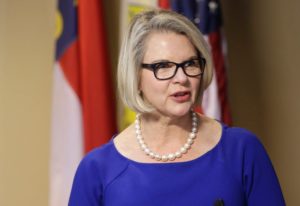by WorldTribune Staff, December 17, 2017
North Carolina’s public universities “are retooling” to become more accessible to students from all backgrounds, according to a new strategy, entitled Higher Expectations.
The plan, announced by Margaret Spellings, president of the University of North Carolina system, calls for recruiting more students from low-income backgrounds and rural areas.

“We can’t have a state where 40 percent of our new jobs are created in just two counties, Mecklenburg and Wake, which make up just 20 percent of our population,” Spellings wrote in a Dec. 16 op-ed for the Raleigh News & Observer.
“We can’t have two North Carolinas. We can’t have a state where the ZIP code you’re born in dictates your future,” she said.
“Rural North Carolina risks being left behind, just as low-income and minority families in our cities risk being left behind. To build an economy where every family can thrive, we must be aggressive and direct in confronting these disparities.”
“This is the challenge at the heart of the University of North Carolina system’s Strategic Plan, entitled Higher Expectations. Across the state, from Asheville, to Chapel Hill, to Elizabeth City, too many talented rural, low-income and first-generation students see college as out of reach, unaffordable or irrelevant to their future and that must change,” Spellings wrote.
“The UNC system’s plan calls for enrolling and graduating more students from low-income families and rural counties, raising graduation rates and closing achievement gaps, and producing more credentials in fields like teaching and health care that are critical to our state’s economy and well-being. All while building on UNC’s historic success at keeping costs low and student debt even lower.”
The Strategic Plan “has the power to transform this state, but a plan is only as good as what it drives us to accomplish,” Spellings wrote.
“That’s why this fall, I signed performance agreements with the chancellors at all 16 of our universities. Each agreement was developed in concert with campus leaders, tailored to each institution’s unique mission and aspirations, and centered on nine measurable and ambitious goals.
“The performance agreements outline aggressive but realistic targets, like a 31 percent increase in low-income graduates at North Carolina A&T and a 17 percent increase in rural graduates at Western Carolina University by 2022.”
Those targets “will mean more students from every background will graduate with the skills to succeed in a changing economy and drive our state forward,” Spellings wrote.
“To truly close the divide that exists between the two North Carolinas, we must prioritize and grow efforts like these and harness the collective strengths of our universities. … Together, they mark the next chapter in North Carolina’s proud history as a leader in public higher education that is truly of and for the people.”
Subscribe to Geostrategy-Direct __________ Support Free Press Foundation
